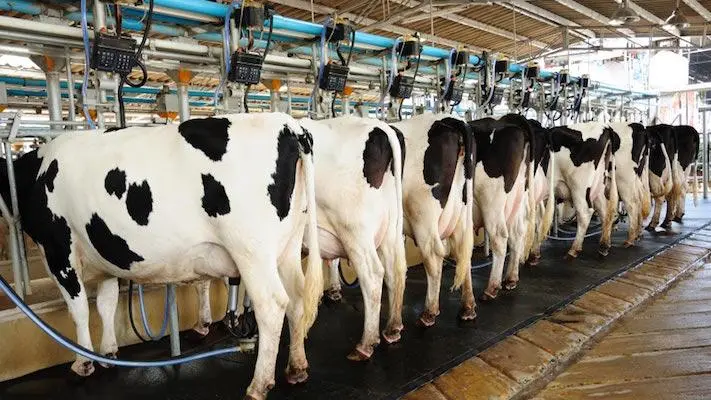Nigeria has immense potential to develop a thriving dairy sector and in recent years the industry has shown remarkable promise and with a rapidly growing population and increasing demand for dairy products, Nigeria has the opportunity to harness its local potential and revolutionise the sector.
By leveraging innovative approaches, empowering local farmers, and embracing sustainable practices, the country can not only meet its domestic demand but also position itself as a significant player in the global dairy market.
Despite being the largest economy in Africa, Nigeria’s dairy industry remains underdeveloped, with the country relying heavily on 75 percent imports to meet its growing demand for dairy products.
Unlocking Local Resources:
There is no doubt that Nigeria is blessed with abundant natural resources, including fertile land and a favourable climate. These factors provide a strong foundation for dairy farming.
To tap into this potential, the government and stakeholders must collaborate to promote agricultural investment and provide support to local farmers. By facilitating access to financing, modern technology, and improved infrastructure, the barriers to entry can be minimised, allowing more individuals to participate in dairy production.
The success of any dairy industry hinges on the quality and productivity of its livestock. In Nigeria, there is a need to focus on enhancing breeding programs and promoting high-yielding dairy cattle breeds. Through strategic crossbreeding, genetic selection, and artificial insemination techniques, local farmers can improve the productivity of their herds, leading to higher milk yields.
According to experts, collaboration with international experts and organisations can provide valuable knowledge and technical assistance in implementing effective breeding programmes.
Unlocking local potential in the dairy sector also involve the need for robust dairy processing infrastructure which remains vital to transform Nigeria’s dairy industry.
Currently, a significant portion of milk produced in the country is wasted due to a lack of adequate processing facilities. To address this issue, investment is required to establish modern processing plants, cold storage facilities, and transportation networks. These facilities will not only ensure that milk is processed and preserved effectively but will also open doors for value-added dairy products such as cheese, yogurt, and butter, increasing the sector’s profitability and creating employment opportunities.
Another significant area that the federal government needs to look into is supporting smallholder farmers. Smallholder farmers form the backbone of Nigeria’s agriculture sector. Empowering these farmers through capacity building programs, access to finance, and knowledge sharing initiatives can significantly boost the dairy industry. Training on best farming practices, animal nutrition, and veterinary care will enhance their skills and ensure sustainable and profitable dairy farming.
Additionally, cooperatives and farmer associations can be formed to facilitate collective bargaining power, improve market access, and foster collaboration among small-scale dairy producers.
Evidence based facts show that promoting sustainability and quality assurance is sin qua non to unlocking the door to a competitive dairy sector. The country should prioritise environmentally friendly practices, such as efficient water and waste management systems, to minimize the industry’s ecological footprint.
Furthermore, implementing robust quality control measures and adhering to international standards will enhance the credibility of Nigerian dairy products both domestically and in the global market. This focus on sustainability and quality will instill confidence in consumers and attract foreign investment in the industry.
Export Potential and Economic Growth:
As Nigeria’s dairy industry matures and attains self-sufficiency, it has the potential to become a net exporter of dairy products. With the right infrastructure, quality control, and marketing strategies, Nigeria can tap into regional and international markets. By leveraging its local potential, the dairy industry can contribute significantly to the country’s economic growth, create employment opportunities, and reduce dependence on imports.
Government Efforts:
According to the minister of agriculture and rural development, Dr Mohammad Mahmood Abubakar, there has been immense collaboration from a wide range of stakeholders in the industry and increased interest in the development of the dairy sector.
He said recent developments in the sector point towards positive impact the ministry and its partners have made in intensifying the need for backward integration, looking inwards and developing indigenous dairy industry in line with the present administration’s policy on local content.
The minister who spoke at an event ahead of the 2023 World Milk Day in Abuja last week disclosed that the federal government has completed the construction and equipping of 13 milk collection centres 2 each in Taraba, Adamawa, Bauchi, Gombe, Kwara, Niger and Plateau States.
The achievements include capacity building and empowerment programmes for some dairy farmers among others.
He also said that the federal government has approved the new national dairy policy, drafted to regulate the Nigerian dairy industry by providing a framework and guiding principles for the development of an efficient dairy sub sector.
According to the minister, the ministry of agriculture and rural development will continue to provide an enabling environment for increased milk production, processing, distribution and consumption to improve the nutritional status of Nigerians, create jobs along the dairy value chain and reduce national expenditure on the importation of milk and milk products.
Nigeria’s dairy industry holds immense promise for both economic development and improving the livelihoods of its population. By harnessing local potential, investing in infrastructure, empowering smallholder farmers, and promoting sustainability, Nigeria can transform its dairy sector into a thriving industry.





